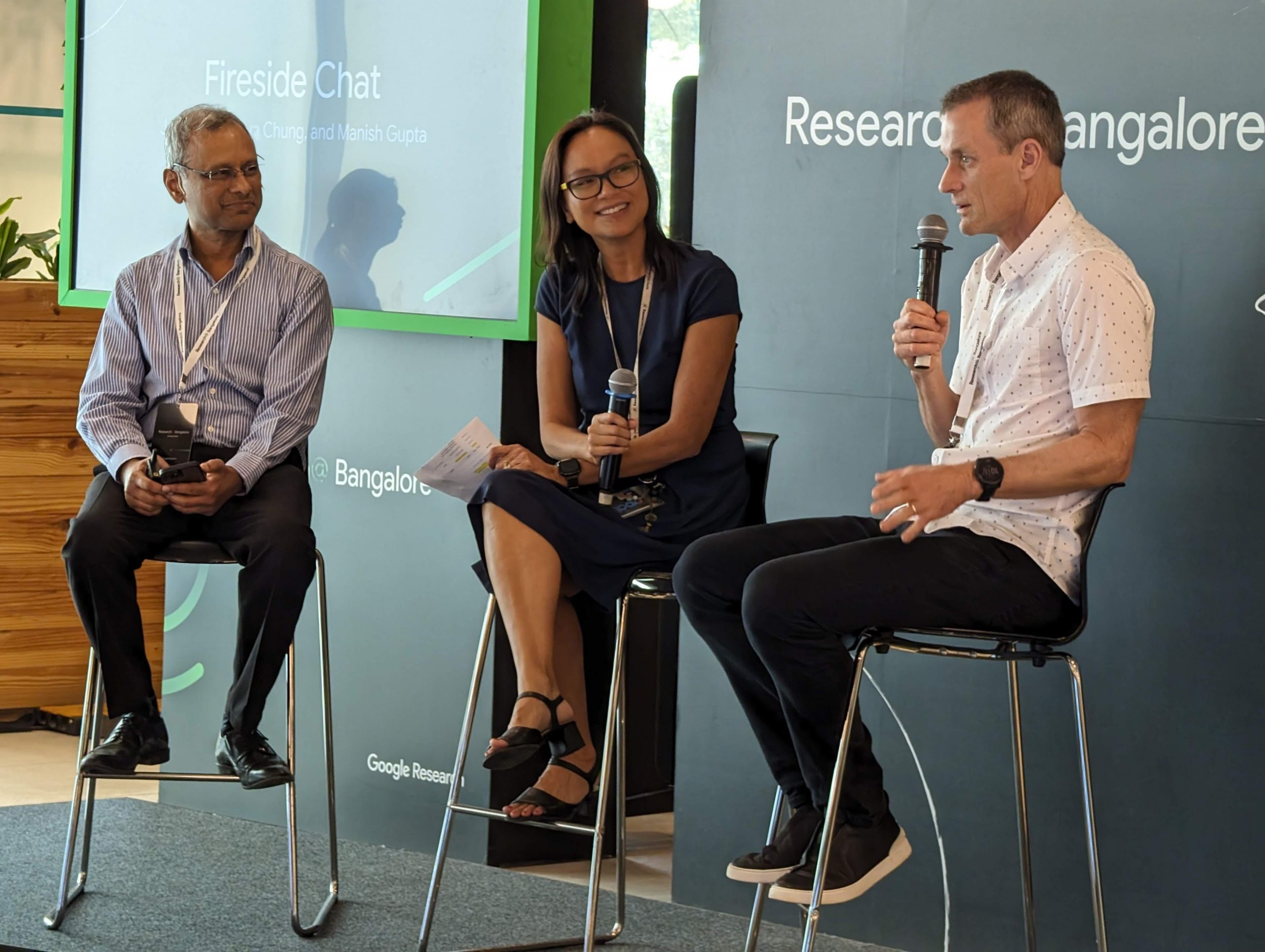)
From Left to Right, Dr Manish Gupta, Director, Research, Google, Dr Grace Chung, Director, Research, Google Ausalia, Dr Jeff Dean, Chief Scientist, Google DeepMind and Google Research at the event in Bengaluru.
India is well-positioned in the area of artificial intelligence, said Dr. Jeff Dean, Chief Scientist, Google DeepMind and Google Research on Thursday, when asked about the role the country will play in the future of AI innovations.
Dean made these comments at the tech giant’s first-ever Research@ event in Bengaluru, alongside leading academic researchers, developers, and startups.
Aimed at exploring the next frontier of AI in India, the event brought together the country’s leading AI practitioners and researchers. They discussed local solutions, and provided a platform for collaborative interaction, to help chart a path for using AI to build a better future. Dr. Dean and other Google leaders joined the event in person discussing the future of AI and its implications for India.
“India has tremendous technical talent; there’s a long tradition of computer science students in India doing amazing things,” said Dr. Dean. “Anyone with an interest in computer science is turning their attention to machine learning and what it can do. India is well-positioned in this area because there are many students that are already in this field and people already in this industry. It’s an important thing across the world.”
The forum also addressed key areas in the development of language models (LLMs) for India. This includes expanding language inclusion to ensure all Indians can access information in their native language, utilizing AI to transform healthcare, optimizing LLM efficiency, and prioritizing responsible AI development.
“One of the efforts I helped encourage was our 1,000 language effort, aiming to make AI models available in all major languages,” said Dr. Dean about Google’s efforts to bridge the digital divide. “This is crucial because many languages spoken by tens of millions of people lack extensive written material. This is really important because making these languages accessible to AI technologies will unlock its potential for different communities that have been previously underserved.”
Key faculty from India’s top educational institutions also participated in the event, sharing insights and research on the local AI landscape.
“This has been a great event, which has brought together the top AI/ML researchers of India in one place,” said Balaraman Ravindran, Professor of Computer Science, IIT Madras. “I hope this event serves as a seed for greater collaboration between both academic researchers and industry.”
Preethi Jyothi, Associate Professor, IIT Bombay, said that events like Research@ are very useful in bringing together academics in India, working on machine learning, along with Google researchers to explore mutual interests. “This includes collectively discussing the next frontiers in the field,” said Jyothi.
Google’s Dr. Dean also emphasized the nature of AI evolution. He added that it is really important to be aware of the rough edges and potential pitfalls that arise on the scaling of machine learning models. “There is a lot of progress on factual accuracy compared to these models a year or two ago,” said Dr. Dean. “It is important we continue to work on maximizing the benefits while actively mitigating the shortcomings.”
Tech giant Alphabet recently introduced its most advanced artificial intelligence model, a technology capable of crunching different forms of information such as video, audio, and text. Called Gemini, the Google owner’s highly anticipated AI model is capable of more sophisticated reasoning and understanding information with a greater degree of nuance than Google’s prior technology, the company said.
In India, the generative AI ecosystem is growing steadily. Generative AI is a type of artificial intelligence technology that can produce various types of content, including text, imagery, audio, and synthetic data. It is expected to disrupt the entire marketing stack and healthcare including drug discovery and create various ‘co-pilot’ opportunities across different verticals.
Krutrim, the generative AI venture, recently said that it has become a unicorn or a startup valued at more than $1 billion, after closing its first round of funding. Krutrim, meaning “artificial” in Sanskrit, unveiled its base Large Language Model (LLM) in December 2023. With the largest representation of Indian data used for its training, it powers generative AI applications for all Indian languages. Trained by a team of leading computer scientists, based in Bengaluru and San Francisco, this model will also power Krutrim’s conversational AI assistant that understands and speaks multiple Indian languages fluently.
Another Indian generative AI startup, Sarvam AI, has unveiled OpenHathi, the first Hindi large language model. Sarvam recently raised $41 million in a Series A round led by Lightspeed and supported by Peak XV Partners and Khosla Ventures. Sarvam is developing a “full-stack” product that can be used for training custom AI models or as an enterprise-grade platform. The company said a full-stack approach will accelerate GenAI adoption in India, given that enterprises acknowledge the technology’s potential but are grappling with how to leverage it for business.
There is also an LLM-based solution, BharatGPT. The solution is a combined effort of CoRover.ai, an AI startup company, and the support system of I-HUB Anubhuti dedicated to developing data-driven cognitive computing solutions.
First Published: Feb 01 2024 | 10:00 PM IST
Note:- (Not all news on the site expresses the point of view of the site, but we transmit this news automatically and translate it through programmatic technology on the site and not from a human editor. The content is auto-generated from a syndicated feed.))



